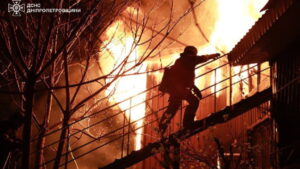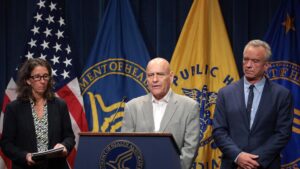Historian David Olusoga was one of the people interviewed in the documentary to talk about race in Britain, and he also wrote for the Observer at the weekend, saying Meghan and Harry’s documentary has hit the raw nerve of tabloid prejudice:
The series reminds us that, back in 2017, when news of her relationship with Harry became public, Meghan and her backstory represented an extraordinary opportunity for the royal family. An interracial couple within the palace was presented by some – even some within the tabloids – as the apotheosis of a modernising process, not just for that institution but for Britain as a whole. The narrative was that Britain, and even her most conservative institutions, could elegantly embrace the diversity of the 21st century while maintaining its traditions.
Ultimately the story of Meghan and Harry became instead an example of conditional Britishness. Calling out the racist aspects of Meghan’s treatment was an unforgivable sin. And like the black and mixed-race players of the England football team – young men who choose to campaign against poverty or express their anti-racism rather than “sticking to football” – the couple were identified as transgressive. They had strayed from the narrow lane allotted to them.
Tabloid rule is rule by intimidation. It has long rested on the presumption that no one – not even the royals – would dare to stand up to the papers. The ongoing barrage of fury against the Sussexes is motivated therefore by more than the usual strategy of selling newspapers by monetising hate. It also reflects a creeping realisation that, for all their toxic and unwarranted power, the tabloids are ultimately incapable of destroying this couple.
Read more here: David Olusoga – Meghan and Harry’s documentary has hit the raw nerve of tabloid prejudice
I must confess that I was one of those a bit unimpressed with the revelations in the first batch of episodes, and didn’t feel that I had learned anything I didn’t already know.
What struck me most of all was that Harry seemed like someone who had been deeply affected by what he had witnessed of the way his mother was treated by the media when he was a young boy, and that he had never had a chance to process that trauma. The sequences showing him and his brother and their cousins as children being ordered around by photographers during a skiing holiday photocall were deeply unpleasant to watch.
As a consequence, it seemed to me, when he felt the same intrusion was being directed at his wife-to-be, he reacted very strongly to it. Given that he has moved ever further from being in line to the throne – as the title of his forthcoming autobiography Spare implies – it felt he had just reached a moment where he had questioned what was the point of them both being put through this any more?
Those viewing figures are all the more remarkable because there was quite a lot of gloating social media noise in the first couple of days after the episodes had launched that Harry & Meghan hadn’t made a dent in the top ten charts that the public can see on the Netflix home screen.
As I mentioned earlier, Netflix have been touting the viewing figures for the documentary as a success. On Wednesday Sian Cain reported for us:
Harry & Meghan, Netflix’s documentary series about Britain’s Prince Harry and his wife, racked up more viewing time on the streaming service than any other documentary during its first week, the company said on Tuesday.
The first three episodes of Harry & Meghan recorded 81.55m viewing hours around the world after its debut last Thursday, Netflix said, “the highest view hours of any documentary title in a premiere week”. More than 28m households watched at least part of the series.
Harry & Meghan was the second-most watched English-language series on Netflix globally between 5 and 11 December, behind Tim Burton’s Addams Family drama Wednesday.
Harry & Meghan was the No 1 English-language series during the week in Britain, and No 2 in Australia and the US. It made Netflix’s television top 10 in 85 countries.
Read more here: Harry and Meghan becomes Netflix’s biggest documentary debut yet
Jenny Afia, who is a partner at Shillings law firm in London, appears in the documentary episodes we are about to get this morning. Yesterday Netflix released a clip in which she says:
There was a real kind of war against Meghan, and I’ve certainly seen evidence that there was negative briefing from the palace against Harry and Megan to suit other people’s agendas. This barrage of negative articles about the breakdown of the relationship with her father was the final straw in a campaign of negative nasty coverage about her.
My colleague Caroline Davies reported on those accusations in the trailer yesterday – Royal households accused of ‘war against Meghan’ to protect palace:
The royal households have been directly accused of deliberately planting negative stories about the Duke and Duchess of Sussex to deflect attention from less favourable coverage of other royals as part of what a lawyer calls “a war against Meghan”.
In the latest trailer for the Sussexes’ controversial Netflix documentary, the duchess’s lawyer, Jenny Afia, claims to have seen evidence of briefing from the palace against the couple.
Meghan appears in the teaser, before the release of the final three episodes on Thursday, saying: “You would just see it play out, like a story about someone in the family would pop up for a minute, and they’d go, ‘We’ve got to make that go away’.
“But there’s real estate on a website homepage, there is real estate there on a newspaper front cover, and something has to be filled in there about someone royal,” she said.
Buckingham Palace and Kensington Palace declined to comment.
Read more here: Royal households accused of ‘war against Meghan’ to protect palace
This last time week we were prepared for a series of blockbuster revelations from the first three episodes of the Harry & Meghan Netflix documentary that, frankly, didn’t materialise. That didn’t stop the show generating acres of media coverage in the UK, and becoming Netflix’s most watched documentary during the last week.
This week’s drop of three episodes will pick up their story just as the couple are about to be married, and the trailer hints that there will be revelations about negative briefing about them coming from other members of the royal family. In a 90-second teaser released on Monday, Harry says: “They were happy to lie to protect my brother,” before adding: “They were never willing to tell the truth to protect us.”
I will be doing the same as I did last week. As soon as the documentary arrives, I’ll start watching it, and I will bring you the key quotes, accusations and revelations over the slightly longer than three hours it will take to get through it – coffee breaks included. At the same time. I’ll also be monitoring other media and social media reaction to it, and will bring you the highlights of that.
As I said previously, you don’t have to be supportive of the royal family, or interested in Harry and Meghan themselves, to be deeply fascinated at what this documentary is attempting to reveal about the royal family’s relationship with the media, and how the reaction to Meghan in the UK can be viewed through the prism of it being a reaction to her race.
You can get in touch with me at martin.belam@theguardian.com.





